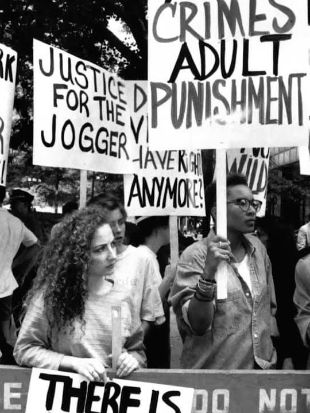
Tales of legal incompetence, judicial negligence, and the lives destroyed in their wake are inherently rich material for documentaries, especially when the victims who spent years in prison are still alive to tell their stories firsthand. The Central Park Five is a great example of this seemingly inherent truth.
Directed, written, and produced by the triumvirate of Ken Burns, Sarah Burns, and David McMahon, the movie revisits the infamous 1989 Central Park Jogger case, in which a wealthy white woman who worked in the financial district was brutally raped while running in Central Park, leaving her disfigured and comatose. Five minority teens -- Anton McCray, Kevin Richardson, Kharey White, Yusef Salaam, and Raymond Santana -- were eventually charged with the crime and convicted, and they served sentences of various lengths.
The film details how the boys came into police custody that night -- they had been part of a larger group that were "making mischief" as one talking head says -- and ended up in squad cars when cops swept through that area of the park. When the comatose victim was found a little later, the police assumed one or several people from this group were responsible, and they began to question the minors for hours on end. Eventually, four of them -- tired, scared, and laboring under the false delusion that they would get to go home if they just said what the cops wanted -- confessed on videotape to the vicious assault. Those tapes are shown in the film, and it's stomach-churning to sit through them as they are juxtaposed with footage of those kids now grown up, talking about their experiences that night.
Burns and his cohorts would have had a fine film if they tackled just this case, but they quickly give us a thorough setup for both how bad the crime problem was in New York City at that time and how toxic race relations were before, during, and after this nationally covered trial. The movie is not only a first-rate piece of social history, but an alarming warning about how easily the justice system can be perverted and how that perversion can lead to wrongs that can never be undone.

Just as disturbing as the coerced confessions -- which each of the alleged perpetrators recanted not long after -- is the case laid out by the filmmakers of how easily the police could and should have apprehended the actual person responsible. We are informed at the end of the movie that the five men are part of an ongoing legal case that was filed against the city in 2003, and what's most frightening is that nearly 25 years after the incident, everyone involved in it -- from the DA to the detectives to even some of the city's newspaper columnists -- continues to stick to the now easily refutable theory that the kids were guilty.
The picture ends on this disquieting note. Sure, there is joy in seeing these men free -- and the story of how the truth finally came out is so fascinating it could be a movie all by itself -- but one of the film's final interviews is with an academic who intones that this case reminds us not how the system eventually got it right, but how easily our conception of American justice can be compromised and overtaken by human error, racism, and fear. It's a sobering documentary that captures America's most beloved city at one of its worst moments.
